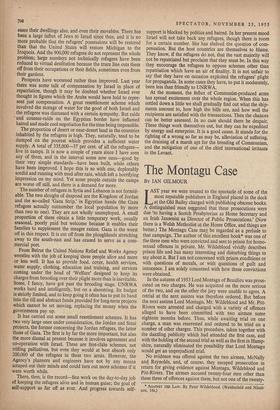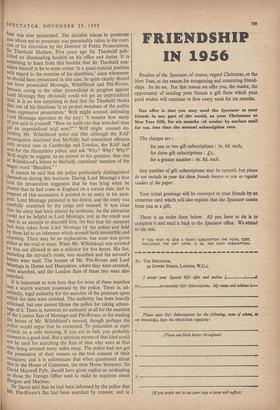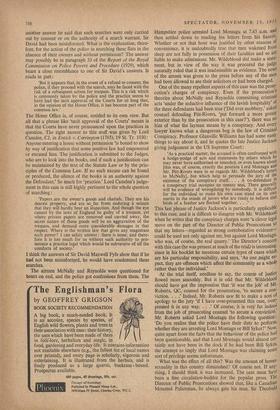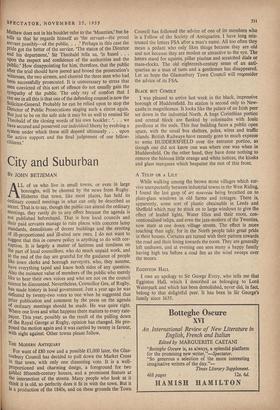The Montagu Case
BY IAN GILMOUR AST year we were treated to the spectacle of some of the most reputable publishers in England placed in the dock at the Old Bailey charged with publishing obscene books. A distinguished man suggested that these prosecutions were due 'to having a Scotch Presbyterian as Home Secretary and an Irish Jansenist as Director of Public Prosecutions' (Now there is a Welsh Methodist at the Home Office, and things are better.) The Montagu Case may, be regarded as a prelude to that campaign. The author of this excellent book* was one of the three men who were convicted and sent to prison for homo- sexual offences in private. Mr. Wildeblood vividly describes prison life and has many interesting and disturbing things to say about it. But I am not concerned with prison conditions or with questions of morals, or with questions of guilt and innocence. I am solely concerned with how these convictions were obtained.
In the autumn of 1953 Lord Montagu of Beaulieu was prose- cuted on two charges. He was acquitted on the more serious of the two, and on the other the jury were unable to agree. A retrial at the next assizes was therefore ordered. But before the next assizes Lord Montagu, Mr. Wildeblood and Mr. Pitt- Rivers were arrested and charged with a variety of offences alleged to have been committed with two airmen some eighteen months before. Thus, while awaiting trial on one charge, a man was rearrested and ordered to be tried on a number of other charges. This procedure, taken together with the dazzling publicity which had attended the first case, and with the holding of the second trial as well as the first, in Hamp- shire, naturally eliminated the possibility that Lord Montagu would get an unprejudiced trial.
No evidence was offered against the two airmen, McNally and Reynolds, and, of course, they escaped prosecution in return for giving evidence against Montagu, Wildeblood and Pitt-Rivers. The airmen accused twenty-four men other than these three of offences against them, but not one of the twenty-
* AGAINST TH,E LAW. By Peter Wildeblood. (Weidenfeld and Nicol- son, 16s.)
four was ever prosecuted. The decision whom to prosecute and whom not to prosecute was presumably taken in the exer- cise of his discretion by the Director of Public Prosecutions, Sir Theobald Mathew. Five years ago Sir Theobald pub- lished an illuminating booklet on his office and duties. It is surprising to learn from this booklet that Sir Theobald con- siders himself to be to some extent 'in a quasi-judicial position with regard to the exercise of his discretion,' since whomever he should have prosecuted in this case, he quite clearly should not have prosecuted Montagu, Wildeblood and Pitt-Rivers, because owing to the other proceedings in progress against Lord Montagu they obviously could not get an unprejudiced trial. It is no less surprising to find that Sir Theobald thinks that, one of his functions 'is to protect members of the public from oppressive prosecution.' Well might counsel defending Lord Montagu speculate to the jury : 'I wonder how many of you said to yourself, "How on earth can that wretched man get an unprejudiced trial now?"' Well might counsel de- fending Mr. Wildeblood point • out that although the RAF investigation disclosed that McNally had committed offences With several men in Cambridge and London, the RAF had sent for the Hampshire police, and ask 'Why? Why? Why?' Well might he suggest, as an answer to his question, that one of Wildeblood's letters to McNally contained 'mention of the Magic word "Beaulieu." ' It cannot be said that the police particularly distinguished themselves during this business. During Lord Montagu's first trial the prosecution suggested that he was lying when he denied that he had come to England on a certain date, and in support of this accusation it pointed to an entry in his pass- Port. Lord Montagu persisted in his denial, and the entry was carefully examined by the judge and counsel. It was clear that the entry had been altered by someone. As the alteration could not be helpful to Lord Montagu, and as the result was used in an attempt to discredit him, the fact that the passport had been taken from Lord Montagu by the police and held by them led to an inference which seemed both irresistible and alarming. There may be an explanation. but none was given either at the trial or since. When Mr. Wildeblood was arrested he Was not allowed to see a solicitor for five hours. His flat, including the servant's room, was searched and his servant's letters were read. The houses of Mr. Pitt-Rivers and Lord Montagu in Dorset and Hampshire, where they were arrested, Were searched, and the London fiats of these two were also searched.
It is important to note here that for none of these searches was a search warrant possessed by the police. There is, ad- mittedly, legal authority for the searches of the premises upon Which the men were arrested. The authority has been heavily criticised, but one cannot blame the police for taking advan- tage of it. There is, however, no authority at all for the searches of the London flats of Montagu and Pitt-Rivers, or for reading the letters of Mr. Wildeblood's servant, though perhaps the Police would argue that he consented. To policemen at eight o'clock on a cold morning, if you• are in bed, you probably Consent to a good deal. But a specious excuse of that kind could not be used for searching the flats of men who were at that time being arrested many miles away. The police had not got the permission of their owners or the true consent of their occupiers; and it is unfortunate that when questioned about this in the House of Commons, the then Home Secretary, Sir David Maxwell Fyfe, should' have given replies as misleading as those the Foreign Office used to make to inquiries about Burgess and Maclean.
Sir David said that he had been informed by the police that Mr. Pitt-Rivers's flat had been searched by consent; and in another answer he said that such searches were only carried out by consent or on the authority of a search warrant. Sir David had been misinformed. What is the explanation, there- fore, for the action of the police in searching these flats in the absence of their owners and without permission? The answer may possibly be in paragraph 33 of the Report of the Royal Commission on Police Powers and Procedure (1929), which bears a close resemblance to one of Sir David's answers. It reads in part: 'But it appears that, in the event of a refusal to consent, the police, if they proceed with the search, may be faced with the risk of a subsequent action for trespass. This is a risk which is commonly taken by the police and the practice seems to have had the tacit approval of the Courts for so long that, in the opinion of the Home Office, it has become part of the common law.'
The Home Office is, of course, entitled to its own view. But all that a phrase like 'tacit approval of the Courts' means is that the Courts have never pronounced upon the practices in question. The right answer to this stuff was given by Lord Camden, CJ, in Entick v. Carrington (1765), 19 St. Tr. 1030: Anyone entering a house without permission 'is bound to show by way of justification that some positive law had empowered or excused him. The justification is submitted to the Judges, who are to look into the books, and if such a justification can be maintained by the text of the Statute Law or by the prin- ciples of the Common Law. If no such excuse can be found or produced, the silence of the books is an authority against the Defendant.' So much for 'practice.' Lord Camden's judge- ment in this case is still highly pertinent to the whole question of searching : 'Papers are the owner's goods and chattels. They are his dearest property, and are so far from enduring a seizure that they will hardly bear an inspection. And though the eye cannot by the laws of England be guilty of a trespass, yet where private papers are removed and carried away, the secret nature of those goods will be an aggravation of the trespass, and demand more considerable damages in that respect. Where is the written law that gives any magistrate such power? I can safely answer : there is none; and there- fore it is too much for us without such authority to pro- nounce a practice legal which would be subversive of all the comforts of society.'
I think the answers of Sir David Maxwell Fyfe show that if he had not been misinformed, he would have condemned these searches.
The airmen McNally and Reynolds were questioned for hours on end, and the police got confessions from them. The Hampshire police arrested Lord Montagu at 7.45 a.m. and then settled down to reading his letters from his fiancée. Whether or not that hour was justified by other reasons of convenience, it is undoubtedly true that men wakened from sleep are not fully in possession of their faculties and so are liable to make admissions. Mr. Wildeblood did make a state• ment, but in view of the way it was procured the judge naturally ruled that it was inadmissible as evidence. The news of the arrests was given to the press before any of the men had been allowed to see their solicitors or had been charged.
One of the many repellent aspects of this case was the prose- cution's charges of conspiracy. Even if the prosecution's theories about McNally and Reynolds committing criminal acts 'under the seductive influence of the lavish hospitality' of the three defendants had been true Mid ever snobbery,' asked counsel defending Pitt-Rivers, 'put forward a more greasy exterior than by the prosecution in this case?'), there was no hint of what the layman means by a conspiracy. And every lawyer knows what a dangerous bog is the law of Criminal Conspiracy. Professor Glanville Williams has had some nasty things to say about it, and he quotes the late Justice Jackson giving judgement in the US Supreme Court: 'As a practical matter, the accused is often confronted with a hodge-podge of acts and statements by others which be may never have authorised or intended, or even known about [this was, of course, exactly the position Lord Montagu and Mr. Pitt-Rivers were in as regards Mr. Wildeblood's letters to McNally], but which help to persuade the jury of the existence of the conspiracy itself. . . . A co-defendant to a conspiracy trial occupies an uneasy seat. There generallY will be evidence of wrongdoing by somebody. It is difficult for the individual to make his own case stand on its owe merits in the minds of jurors who are ready to believe that birds of a feather are flocked together. . .
This last phrase of Justice Jackson's is particularly applicable to this case, and it is difficult to disagree with Mr. Wildeblood when he writes that the conspiracy charges were 'a clever legal move on the part of the Director of Public Prosecutions so that my letters—regarded as strong corroborative evidence-- could be used not only against me, but against Lord Montagu, who was, of course, the real quarry.' The Director's concern with this case (he was present at much of the trial) is interesting• since in his booklet he mentions certain types of cases which are his particular responsibility, and says, 'As one might w• pect, they are offences which affect the community as a whole rather than the individual.'
At the trial itself, needless to say, the course of justice flowed more smoothly. But it is odd that Mr. Wildeblood should have got the impression that 'it was the job' of Mr. Roberts, QC. counsel for the prosecution, `to secure a con- viction. . . .' Indeed, Mr. Roberts saw fit to make a sort of apology to the jury 'if I have over-presented this case, over• pressed it in any way. . . Of course, it is very far indeed from the job of prosecuting counsel `to secure a conviction. Mr. Roberts asked Lord Montagu the following question: `Do you realise that the police have their duty to perform. whether they are arresting Lord Montagu or Bill Sykes?' Now. quite apart from the facts that the behaviour of the police had been questionable, and that Lord Montagu would almost ce:• tainly not have been in the dock if lie had been Bill Sykes. the attempt to imply that Lord Montagu was claiming some sort of privilege seems unfortunate.
What was the effect of all this? Was the amount of homo sexuality in this country diminished? Of course not. If any thing, 1 should think it was increased. The case must have been a fine circulation-builder for the popular press. The Director of Public Prosecutions showed that, like a Canadian Mounted Policeman, he always gets his man. Sir Thcobald Mathew does not in his booklet refer to the 'Mounties,' but he tells us that he regards himself as 'the servant—the proud servant possibly—of the public. . . .' Perhaps in this case the pride got the better of the service. 'The status of the Director and his department,' Sir Theobald tells us, 'is based . . . upon the respect and confidence of the authorities and the Public.' How disappointing for him; therefore, that the public after the trial should have jeered and booed the prosecution's witnesses, the two airmen, and cheered the three men who had, been successfully prosecuted. It is unnecessary to stress that men convicted of this sort of offence do not usually gain the sympathy of the public. The only ray of comfort that I can see in all this is that one of the defending counsel is now the Solicitor-General. Probably he can be relied upon to stop the Director of Public Prosecutions staging such a circus again. But just to be on the safe side it may be as well to remind Sir Theobald of the closing words of his own booklet : . . we have secured and preserved our individual liberty by evolving a system under which these still depend ultimately . . . upon the active support and the final judgement of our fellow- citizens.'





























































 Previous page
Previous page